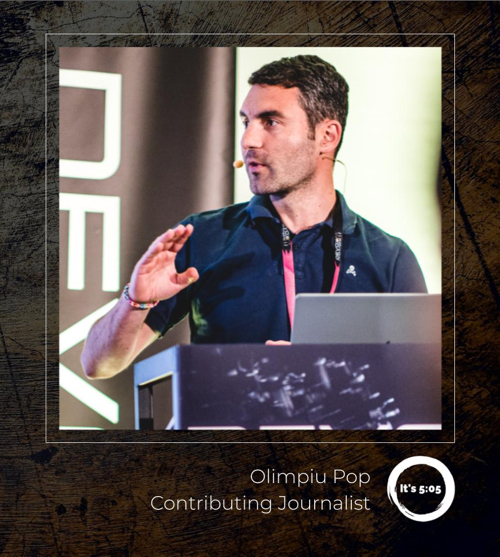March 1st, 2024

In this Episode:
It’s March 1st, 2024 and time for Point of View Friday, where we cover a single topic from multiple perspectives. Today’s point of discussion is around the anticipation of advancements in quantum computing and the massive overhauls of technology taking place. We have perspectives from Trac Bannon in Camp Hill, Pennsylvania, Olimpiu Pop from Transylvania, Romania, and Katy Craig in San Diego, California. We’ll start with Trac Bannon.
Tracy (Trac) Bannon Apple’s Forward Thinking Cryptography
 Got to give kudos when kudos are due. Apple is really demonstrating their forward thinking again, this time with cryptography.
Got to give kudos when kudos are due. Apple is really demonstrating their forward thinking again, this time with cryptography.
Hello. This is Trac Bannon reporting from Camp Hill, Pennsylvania.
Apple’s recent rollout of the PQ3 cryptographic protocol for iMessage marks a big step forward. Why? Because it is designed to protect against future threats posed by quantum computers.
Since its inception in 2011, Apple’s iMessage has continually set benchmarks for secure communication. The iMessage protocol’s evolution from RSA to Elliptic Curve Cryptography, ECC, and now to PQ3 is a great example of forward-thinking security.
Now that quantum computing is becoming mainstream, it presents a formidable challenge. It threatens to render our current cryptographic standards obsolete. While quantum computers capable of breaking our existing encryption methods aren’t a reality quite yet, the potential risk can’t be ignored. Apple’s proactive stance with PQ3, integrating post quantum cryptography to protect against both present and future threats, demonstrates their dedication to user privacy.
PQ3 isn’t just another upgrade, it’s a comprehensive redesign of iMessage’s cryptographic framework. Apple’s goal is that every message is safeguarded against the quantum threats of tomorrow while maintaining the robust security standards of today. What I appreciate in Apple’s approach is that they’re focusing on designing for change, designing for the inevitable technological evolution.
A ton of work goes into this type of foundational change, especially when security is in focus. Meticulous planning, thorough testing and continuous refinement. Apple’s journey with iMessages encryption- from its initial implementation to the cutting edge- PQ3 is a compelling narrative, isn’t it?
While technology moves fast, securing it against future threat requires foresight, patience, and innovation.
So the next time you pull out your iPhone or iPad to send an iMessage, take a moment to appreciate the invisible shield of PQ3. It’s Apple’s way of ensuring that your digital chats, from the most mundane to the momentous, are safeguarded for today and poised for tomorrow’s challenges. Something to noodle on.
Katy Craig
Apple Quantum Encryption
 Apple has announced a groundbreaking upgrade to its iMessage platform, introducing a new encryption protocol dubbed PQ3. A testament to the tech industry’s anticipation of quantum computing breakthroughs, this move threatens to render current encryption methods obsolete.
Apple has announced a groundbreaking upgrade to its iMessage platform, introducing a new encryption protocol dubbed PQ3. A testament to the tech industry’s anticipation of quantum computing breakthroughs, this move threatens to render current encryption methods obsolete.
This is Katy Craig in San Diego, California.
Apple’s latest innovation isn’t just a simple tweak; it’s a complete overhaul of the iMessage cryptographic protocol. The company’s blog post reveals a project of ambitious scale, aiming to rebuild the platform’s security from the ground up. By the end of this year, PQ3 will be the new standard across all supported iMessage conversations, marking a significant leap forward in protecting user privacy.
But why this sudden quantum leap? The answer lies in the looming shadow of “Q-Day,” a moment feared by government officials and scientists alike. Q-Day represents a potential future where quantum computers, with their ability to harness subatomic particles, could easily break the encryption that guards our most private communications. This scenario has sparked a global race, notably between the United States and China, to develop what’s known as post-quantum cryptography. These new standards are designed to withstand the quantum computing era, ensuring our digital conversations remain secure.
The urgency of this shift is underscored by reports of massive data interception by nations in preparation for Q-Day. The strategy, often referred to as “catch now, crack later,” involves collecting encrypted data now, with the intention of decrypting it once quantum computing becomes capable. This approach highlights the critical need for advancements, like Apple’s PQ3 protocol, setting a new benchmark in the quest for quantum-resistant encryption.
Apple’s initiative signals a broader movement within the U.S. tech industry to brace for the quantum future. By prioritizing the development of post-quantum cryptography, companies like Apple are not just protecting their users, they’re taking a stand in the global technological rivalry. The race to quantum-proof our digital world is on, and Apple’s latest update to iMessage is a clear sign that the tech giants are preparing for whatever the future holds.
Apple’s PQ3 protocol is more than just a technical update. It’s a strategic move in the ever-evolving landscape of cybersecurity. As we edge closer to the quantum era, initiatives like these will be vital in safeguarding our digital lives. Stay tuned, stay secure, and keep an eye on the horizon because the future of encryption is here, and it’s quantum-resistant.
This is Katy Craig, stay safe out there.
Olimpiu Pop
PQ3 The Postquantum Cryptographic Reference Architecture?
Post-pandemic it seems that we are seeing wave after wave of innovation and innovation changes in the tech space. Probably the biggest ever seen. AI, right?
Not only that, quantum is slowly coming. And in the same manner as AI, it will have a huge impact on everything we do. One area that will be impacted is the privacy and security field.
Mainly because cryptography relied on mathematical problems that would be too hard to solve with the existing computing power, even if we factor in Moore’s Law.
Quantum computing promises, or threatens to disrupt this and not far ago, the messaging app signal promised that their encryption will survive a quantum apocalypse. Apple raised that bet, or at least that’s what they say. Improved privacy is good, or is it?
The Pros of postquantum computing are:
- PQ3’s post-quantum cryptography ensures that the application will remain secure against future quantum computer attacks.
- With its periodic rekeying mechanism, PQ3 introduces a self-healing feature that can recover from key compromises, promising enhanced resilience of encrypted communications against sophisticated attacks.
- The protocol has undergone extensive formal verification from the industry and academia, so we can say it has become a benchmark.
Cons of PQ3 in iMessage:
- Post-quantum cryptography is complex. And where there is complexity, overhead could impact performance and user experience.
- Being a pioneer is never easy, there may be unforeseen vulnerabilities or implementation errors that could compromise security.
- How about older devices or systems? Will their users be excluded?
All in all, I am excited about what it brings. PQ3 represents a significant and necessary evolution in cryptographic security. Even if it will require multiple iterations to do what it promised, it’s still evolving. The self-healing feature, which can recover from key compromises, is particularly compelling, offering a level of security resilience previously unattainable. Complex? Yes! But what’s not complex today?!
The balance between future-proofing our digital communications against quantum threats and dealing with the immediate challenges of implementing complex new technologies, and prioritizing security is paramount. Thus, the benefits of adopting PQ3, in terms of enhanced security and proactive protection against quantum computing threats, far outweigh the cons.
Olimpiu Pop, reported from Transylvania Romania happy to talk about another type of innovation than just AI.
Resources
https://security.apple.com/blog/imessage-pq3/
Hillary Coover:
Thanks for listening to point of view Friday, if you like what you heard, please subscribe to “It’s 5:05″ on your favorite podcast platform. ” It’s 5:05″ is a Sourced Network Production based in New York City. This is your host, Hillary Coover. Have a great weekend.













